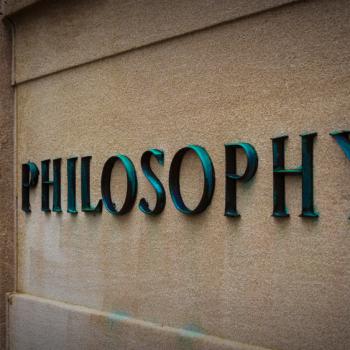How do you get Christians to care about state-church separation? Teach yoga in schools. Soon, Jesus followers will be tripping over themselves to assert their fondness for the Establishment Clause.
That’s exactly what happened in Ohio, where 105 pastors have seen to it that yoga classes may not be taught in local public schools. The clergymen consider yoga a religion, or at least an activity with a spiritual dimension that is incompatible with Christianity. When yoga classes are introduced in schools, they wrote in a recent letter to school districts, that’s problematic from a First Amendment / Establishment Clause point of view.

The letter reads, in part:
The endorsement of yoga is a violation of the First Amendment’s Establishment clause, which forbids government from picking religious winners and losers and enforcing its choice.
Holy hell — they finally get it! But then that sentence is immediately followed by this:
Without question, Eastern Religion is a practice in conflict with the vast majority of those in our region whether from Judeo-Christian traditions or otherwise.
That has nothing to do with it. Though I’m sure they’d like to believe otherwise, their Christian faction, admittedly in the majority, has zero extra rights over Ohio’s three Rastafarians or seven Satanists. (Yeah, I just made those numbers up. You get the point.)
Anyway, the pastors sent their letter, and the school district heads caved.
Lexington Local School District Superintendent Mike Ziegelhofer explained that he will take steps to ensure that schools in the district are abiding by the law. … Effective immediately, upon our return to school, all employees of the Lexington Local School District will be notified in writing via e-mail that the use or endorsement of and/or any inference of the use or endorsement of yoga, any forms of transcendental meditation and the promotion, endorsement or practice of any religious beliefs is not permitted within the Lexington Local School District during school hours,” Ziegelhofer wrote.
Lucas Local School District Superintendent Bradley Herman also submitted a response letter, saying that his school district also intends to uphold the law.
“As a public school district, we are mindful of the Establishment Clause of the First Amendment and the prohibition of religious instruction,” Herman said in a letter sent to Rev. El Akuchie of the Richland Community Prayer Network and Godsfield House of Prayer.
Are the pastors correct that yoga has a serious religious dimension? U.S. jurisprudence appears to be on their side. In a 1988 Arkansas case, Powell v. Perry, the U.S. Court of Appeals for the 8th Circuit said that “yoga is a method of practicing Hinduism.” The Christian Post reminds us that
… in 1995, the U.S. Court of Appeals for the [9th] Circuit in the case of Self Realization Fellowship Church v. Ananda Church of Self Realization labeled the “Hindu-Yoga spiritual tradition” as a “religious tradition.” In 1979, the 3rd Circuit ruled in the case of Malnak v. Yogi that transcendental meditation can be considered religious and an unconstitutional establishment of religion.
Based on my own experience, I consider transcendental meditation, with its veneration of the Maharashi Mahesh Yogi, uncomfortably close to a (half-baked) religion. Yoga, not so much, but opinion on that score is divided. You don’t have to be an angsty Jesus fan to concede that, depending on which yoga precepts are taught, its practice (derived from the Vedic / Hindu tradition) can veer into spiritual and religious territory. For consistency’s sake, it might be a good idea for atheists and agnostics to make common cause with the pastors (difficult though that may be!), and to err on the side of preferring that yoga instruction and public schools remain separate.
I do recommend reading the pastors’ letter, if only for a bit of comic relief. The epistle is remarkable not only because of the Christians’ sudden affection for the Establishment Clause, but also for this revealing paragraph:
While proponents of Eastern Religion allege yoga brings benefits to student practitioners, our Biblical faith tradition brings just as many if not more scientifically proven benefits. Yet ironically in a nation with Judeo-Christian heritage it is school sanctioned prayer, Intelligent Design curriculum and the display of the Ten Commandments that are strictly prohibited from public schools.
The phrase about “scientifically proven benefits” is good for a chuckle; but to me, the truly amusing part is the pique that emanates from the second sentence. It leaves little doubt that the 105 signatories would deep-six the Establishment Clause in a heartbeat if they had half a chance to elevate Christianity to the official state religion.
Their concern for the First Amendment is as thin as a page from a cheap Bible. They may be our accidental allies on the yoga question, but we’d do well to keep a very watchful eye on these ambitious, unembarrassed theocrats.
-=-=-=-=-=-=-=-=-=-=-=-=-=-=-=-=-=-
P.S.: Hemant respectfully disagrees with me on this (no doubt some others will too), saying that the schools in question don’t appear to have veered into spiritual or religious territory, and have given no indication that they will. Fair enough. I don’t think there’s any disagreement about the Vedic / Hindu / Buddhist origins of yoga, though, or about the fact that the word Namaste for example (the standard opening of many yoga classes), means “I bow to the divine in you.”
But maybe I’m overly cautious here, with regard to the Establishment Clause. If so, feel free to tell me in the comments.
The jurisprudence on yoga in schools isn’t uniform; nor are atheists’ opinions on this matter. For different perspectives from other Friendly Atheist writers, here are yoga-related posts by Hemant, Beth Stoneburner, and Rachel Ford.
One thing I’ve always liked about this place is that the writers are free to spar, sometimes passionately and at length, and that this does nothing to cool our regard for each other. Here’s a fine example.
(Image via Shutterstock)




It’s Moving Day for the Friendly ..."
It’s Moving Day for the Friendly ..."
It’s Moving Day for the Friendly ..."
It’s Moving Day for the Friendly ..."